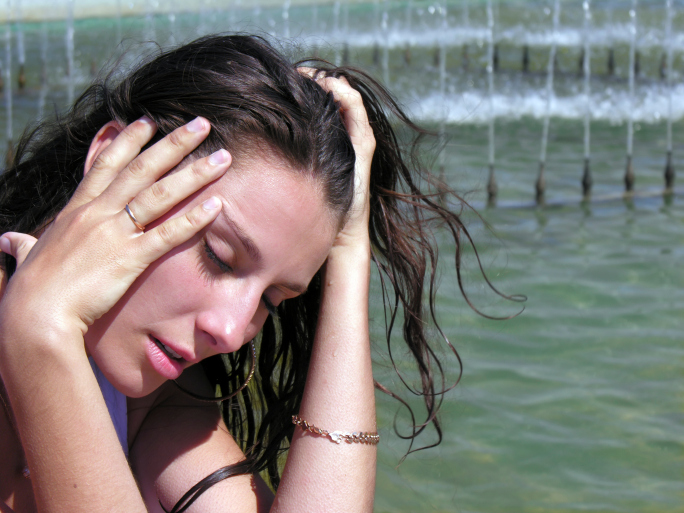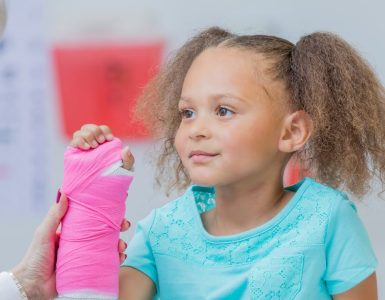Kids might be headed back to school, but summer isn’t over yet! With warmer temperatures still here, it’s important to understand how to protect yourself from heat-related illnesses. Read on to learn how you can prevent and treat heat-related illnesses including heat exhaustion and heatstroke, conditions that can be caused by your body overheating.
About Heat-Related Illness
What happens to the body as a result of exposure to heat?
When you are in the heat, your body normally cools itself by sweating. But under some conditions, especially heat combined with high humidity, sweating just isn’t enough, and a person’s body temperature could rise rapidly. People suffer heat-related illness when the body’s temperature control system is overloaded. Very high body temperatures may damage the brain, heart, kidneys and muscles. The damage worsens the longer treatment is delayed, increasing your risk of serious complications or death.
How can the body no longer cool itself?
Several factors affect the body’s ability to cool itself during extremely hot weather. When there is high humidity, sweat does not evaporate as quickly, preventing the body from releasing heat quickly. Other conditions that can limit the ability to regulate temperature include:
- Old age
- Youth (age 0-4)
- Obesity
- Fever
- Dehydration
- Heart disease
- Mental illness
- Poor circulation
- Sunburn
- Certain prescription drugs , alcohol use
Who is at greatest risk for heat-related illness?
Those at greatest risk for suffering a heat-related illness include infants and children up to four years of age, people 65 years of age and older, and people who are overweight, ill, and/or on certain medications.
About Heat Exhaustion
What is heat exhaustion?
Heat exhaustion is a condition related to your body overheating. It can be caused by exposure to high temperatures, especially when there is also high humidity, and strenuous physical activity. Quick treatment is needed because untreated heat exhaustion can lead to heatstroke, a life-threatening condition.
What are the symptoms of heat exhaustion?
Signs of heat exhaustion may develop quickly, and can include:
- Cool, moist skin with goose bumps while in the heat
- Heavy sweating
- Faintness, dizziness, and/or fatigue
- Weak, rapid pulse
- Low blood pressure when standing
- Muscle cramps, nausea, and/or headache
What should I do if I am exhibiting signs of heat exhaustion?
- Rest—stop all physical activity
- Sit in a cooler place
- Drink cool water or sports drinks
- If symptoms worsen or do not improve within one hour, call your doctor. And if your temperature is 104°F or higher, seek immediate medical attention.
Heatstroke FAQ
What is heatstroke?
According to the Mayo Clinic, heatstroke is the most serious heat-related illness. It often occurs due to prolonged exposure to, or physical exertion in, high temperatures. Heatstroke can occur when the body’s temperature reaches 104°F or higher. Heatstroke can cause serious complications, including death. Emergency treatment must be provided!
What can cause heatstroke?
Heatstroke can occur as a result of exposure to a hot environment for a prolonged period of time, especially during intense physical activity or when you are dehydrated, wearing excess clothing, or drinking alcohol.
What are the warning signs of heatstroke?
Warning signs of heatstroke vary but may include the following:
- An extremely high body temperature (above 104°F)
- Red, hot, and dry skin (no sweating)
- Rapid, strong pulse
- Throbbing headache
- Dizziness
- Nausea
- Confusion
- Unconsciousness
Protect Yourself in the Heat
How can people protect their health when temperatures are extremely high?
- Drink plenty of fluid
- Wear appropriate clothing (don’t forget sunscreen!)
- Pace yourself if you’re exercising
- Go inside to stay cool
- Schedule outdoor activities carefully—aim for mornings and evenings if possible
- Use a buddy system and monitor those at higher risk
How much should I drink during hot weather?
During hot weather you will need to drink more liquid than your thirst indicates. Increase your fluid intake, regardless of your activity level. During heavy exercise in a hot environment, drink two to four glasses (16-32 ounces) of cool fluids each hour. Avoid drinks containing alcohol because they can actually cause you to lose more fluid.
What should I do if I work in a hot environment?
- Pace yourself.
- Wear lightweight clothing, and a hat to shade from the sun.
- Use moist towels to help cool yourself.
- Stay well-hydrated.
- Take frequent breaks. If you are not accustomed to working or exercising in a hot environment, start slowly and pick up the pace gradually; however, a level of exertion that is sustainable at lower temperatures may NOT be possible in a hot environment. If exertion in the heat makes your heart pound and leaves you gasping for breath, STOP all activity. Get into a cool area or at least in the shade, and rest, especially if you become lightheaded, confused, weak, or faint—those are actually the beginning signs of heat-related illness.
How effective are electric fans in preventing heat-related illness?
Electric fans may provide comfort, but when the temperature is in the high 90s, fans alone will not prevent heat-related illness. Taking a cool shower or bath or moving to an air-conditioned place is a much better way to cool off. Air conditioning is the strongest protective factor against heat-related illness. Exposure to air conditioning for even a few hours a day can reduce the risk for heat-related illness. Don’t have air conditioning at home? Consider visiting a shopping mall or public library for a few hours.
If you’re a Health Advocate member, reach out to us for more information about how to stay safe in the heat.
Have a question for a Health Advocate? Email nhess@healthadvocate.com, and your question may be the topic of an upcoming “Ask a Health Advocate” column!
Sources: Mayo Clinic; NCEH’s Health Studies Branch



